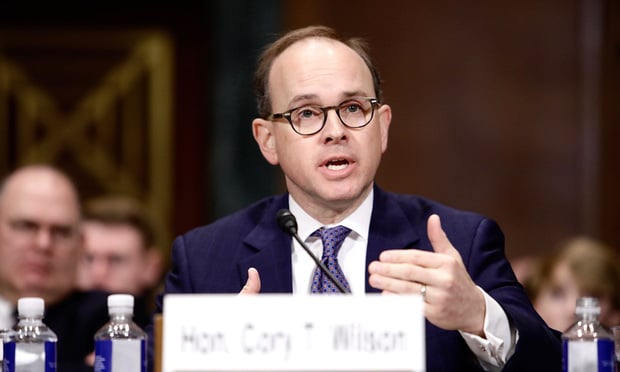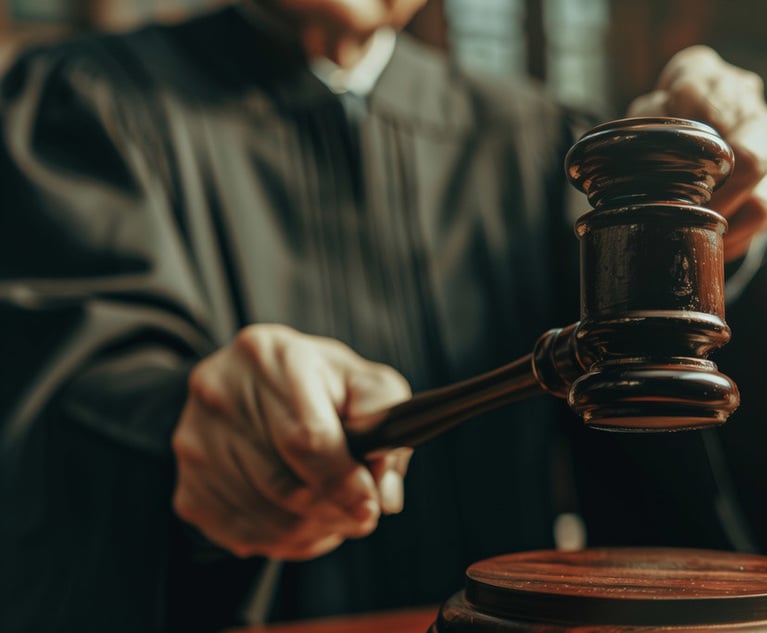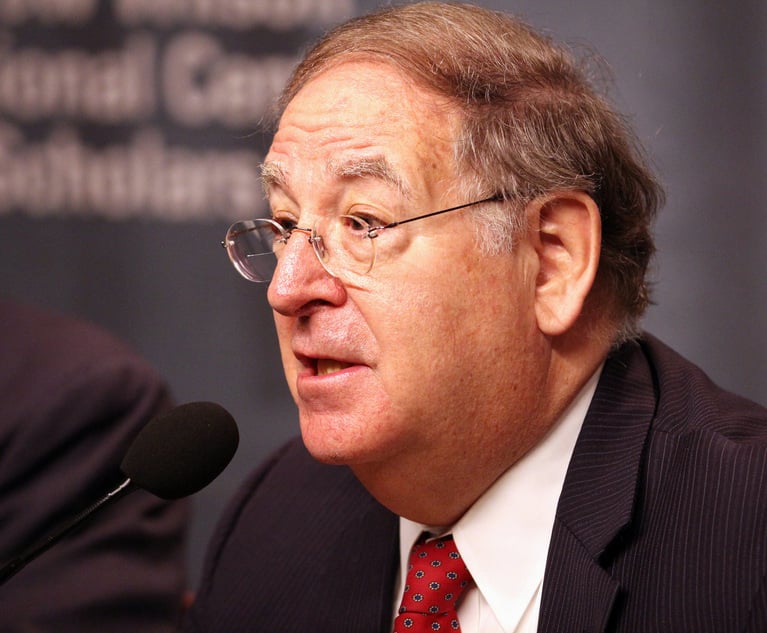Trump Judicial Nominee Faces Questions Over Recently Renewed Federalist Society Membership
"Did anyone suggest to you that you should rejoin the Federalist Society in order to increase your chances of becoming a member of the judiciary?" Democratic Sen. Richard Blumenthal asked nominee Cory Wilson.
January 08, 2020 at 01:48 PM
6 minute read
 Cory Wilson testifies before the Senate Judiciary Committee during his confirmation hearing to be a U.S. district judge for the Southern District of Mississippi, on Wednesday, Jan. 8, 2020. Photo: Diego M. Radzinschi/ALM
Cory Wilson testifies before the Senate Judiciary Committee during his confirmation hearing to be a U.S. district judge for the Southern District of Mississippi, on Wednesday, Jan. 8, 2020. Photo: Diego M. Radzinschi/ALM
The Federalist Society figured prominently in a Senate Judiciary Committee hearing on judicial nominees Wednesday, as details emerge about a new conservative network created by the group's leader.
Democrats on the committee focused much of their questioning during Wednesday's hearing toward Cory Wilson, a nominee for the Southern District of Mississippi and a current judge on the Mississippi Court of Appeals.
Sen. Richard Blumenthal, D-Connecticut, asked Wilson about his membership with the Federalist Society, noting he recently rejoined the group after letting his involvement lapse for more than a decade.
"Did anyone suggest to you that you should rejoin the Federalist Society in order to increase your chances of becoming a member of the judiciary?" Blumenthal asked.
"Not that I recall," Wilson replied, saying he initially joined the organization when he was at Yale Law, and recalled it being a "great forum for discussion" with "great speakers."
Wilson said he did not believe the organization was active in Mississippi in recent years, and that he rejoined because he "appreciated the debates" and events the Federalist Society offers.
Wilson also said he didn't recall discussing the Federalist Society with anyone at the White House.
The right-leaning Federalist Society, and more specifically its leader Leonard Leo, have played an outsize role in helping Trump shepherd judicial nominees through the Senate and onto the federal bench.
However, Axios first reported this week that Leo will be stepping back from the daily running of the Federalist Society to start a new conservative organization called CRC Advisors.
Leo will stay on as co-chair of the Federalist Society's board, but he will now be working alongside CRC Strategies President Greg Mueller in a more political venture, the men said in a statement. One of their first projects will be a $10 million advocacy campaign ahead of the 2020 election focused on judges, Leo told Axios.
"We have both worked for over three decades to build winning ventures, and our many partnerships have brought success across a wide range of challenges, most notably the many judicial confirmation battles undertaken as part of a broad effort to reshape the federal judiciary, reform our legal system, advance the rule of law, and protect our country's freedoms," Leo and Mueller said in a joint statement.
Following Blumenthal's questions, Republican Sen. Mike Lee offered up a full defense of the Federalist Society.
"This is, in no way, shape or form, something that should be the subject of legitimate inquiry, especially when one understands that the Federalist Society is there to provide an open forum for debate, discussions and conversations about the Constitution, the law, federalism, the separation of power—things that I believe all of us as lawyers have taken an oath to uphold and protect and defend," Lee said.
The Utah Republican noted that he himself has been a Federalist Society member for years, and began attending their events when he was in high school.
"Anyone who understands true fun as a teenager should attend a Federalist Society event," Lee said to laughs.
And Lee used the opportunity to again raise his concerns about the "outsize role" the American Bar Association has played in judicial nominees. The ABA questions nominees and reviews their records before making a recommendation to the committee.
Conservatives have criticized the group for giving a series of "not qualified" ratings to nine Trump nominees. The most recent rating, which came for Lawrence VanDyke, described him as "arrogant, lazy, an ideologue, and lacking in knowledge of the day-to-day practice." VanDyke was still confirmed to the U.S. Court of Appeals for the Ninth Circuit.
Other Democrats on Wednesday's panel, including Senate Judiciary Committee ranking member Sen. Dianne Feinstein, raised concerns about previous writings and remarks Wilson made as a commentator and member of the Mississippi state Legislature.
They pointed to Wilson's comments opposing the Affordable Care Act and same-sex marriage, and for opposing gun restrictions as reason for concern.
Feinstein in particular said she would not be able to vote for Wilson unless he said he is committed to defending those rights.
Wilson said those statements were not made in his capacity as a judge, but as an elected official and policymaker. He said that he would not allow those viewpoints to impact his rulings from the bench.
The other four nominees on the panel—William Hardy for the Western District of Pennsylvania, John Heil for the Northern, Eastern and Western Districts of Oklahoma, David Joseph for the Western District of Louisiana and Edward Meyers for the Federal Claims Court—faced few questions from Democrats.
Hardy is a shareholder at Ogletree Deakins, where he reported earning a total of more than $1.2 million in 2018 and 2019, according to his financial disclosure report. Heil is a shareholder at Hall Estill in Oklahoma, and reported earning just over $1 million between 2018 and 2019, according to his disclosure.
Meyers, a partner at Stein Mitchell Beato & Missner, reported earning $187,500 from the firm in 2019, after previously taking home gross incomes for about $238,500 in 2018 and $363,000 in 2017.
That's a far cry from the $6.7 million White House counsel Pat Cipollone reported earning from Stein Mitchell from 2017 through 2018.
Read more:
White House Counsel Pat Cipollone's Financial Disclosure Shows $6.7M Income
'Arrogant,' 'Lazy,' 'Ideologue': Another Trump Nominee Gets 'Not Qualified' ABA Rating
Trump Lawyer Emmet Flood's Financial Disclosure Shows $3.3M Partner Share
This content has been archived. It is available through our partners, LexisNexis® and Bloomberg Law.
To view this content, please continue to their sites.
Not a Lexis Subscriber?
Subscribe Now
Not a Bloomberg Law Subscriber?
Subscribe Now
NOT FOR REPRINT
© 2025 ALM Global, LLC, All Rights Reserved. Request academic re-use from www.copyright.com. All other uses, submit a request to [email protected]. For more information visit Asset & Logo Licensing.
You Might Like
View All
Who Are the Judges Assigned to Challenges to Trump’s Birthright Citizenship Order?

‘Undermines the Rule of Law’: Retired US Judges Condemn Trump’s Jan. 6 Pardons

'If the Job Is Better, You Get Better': Chief District Judge Discusses Overcoming Negative Perceptions

'Thoughtful Jurist': Maryland US District Senior Judge Messitte Dies After Short Illness
4 minute readLaw Firms Mentioned
Trending Stories
- 1'Reverse Robin Hood': Capital One Swarmed With Class Actions Alleging Theft of Influencer Commissions in January
- 2Hawaii wildfire victims spared from testifying after last-minute deal over $4B settlement
- 3How We Won It: Latham Secures Back-to-Back ITC Patent Wins for California Companies
- 4Meta agrees to pay $25 million to settle lawsuit from Trump after Jan. 6 suspension
- 5Stevens & Lee Hires Ex-Middle District of Pennsylvania U.S. Attorney as White-Collar Co-Chair
Who Got The Work
J. Brugh Lower of Gibbons has entered an appearance for industrial equipment supplier Devco Corporation in a pending trademark infringement lawsuit. The suit, accusing the defendant of selling knock-off Graco products, was filed Dec. 18 in New Jersey District Court by Rivkin Radler on behalf of Graco Inc. and Graco Minnesota. The case, assigned to U.S. District Judge Zahid N. Quraishi, is 3:24-cv-11294, Graco Inc. et al v. Devco Corporation.
Who Got The Work
Rebecca Maller-Stein and Kent A. Yalowitz of Arnold & Porter Kaye Scholer have entered their appearances for Hanaco Venture Capital and its executives, Lior Prosor and David Frankel, in a pending securities lawsuit. The action, filed on Dec. 24 in New York Southern District Court by Zell, Aron & Co. on behalf of Goldeneye Advisors, accuses the defendants of negligently and fraudulently managing the plaintiff's $1 million investment. The case, assigned to U.S. District Judge Vernon S. Broderick, is 1:24-cv-09918, Goldeneye Advisors, LLC v. Hanaco Venture Capital, Ltd. et al.
Who Got The Work
Attorneys from A&O Shearman has stepped in as defense counsel for Toronto-Dominion Bank and other defendants in a pending securities class action. The suit, filed Dec. 11 in New York Southern District Court by Bleichmar Fonti & Auld, accuses the defendants of concealing the bank's 'pervasive' deficiencies in regards to its compliance with the Bank Secrecy Act and the quality of its anti-money laundering controls. The case, assigned to U.S. District Judge Arun Subramanian, is 1:24-cv-09445, Gonzalez v. The Toronto-Dominion Bank et al.
Who Got The Work
Crown Castle International, a Pennsylvania company providing shared communications infrastructure, has turned to Luke D. Wolf of Gordon Rees Scully Mansukhani to fend off a pending breach-of-contract lawsuit. The court action, filed Nov. 25 in Michigan Eastern District Court by Hooper Hathaway PC on behalf of The Town Residences LLC, accuses Crown Castle of failing to transfer approximately $30,000 in utility payments from T-Mobile in breach of a roof-top lease and assignment agreement. The case, assigned to U.S. District Judge Susan K. Declercq, is 2:24-cv-13131, The Town Residences LLC v. T-Mobile US, Inc. et al.
Who Got The Work
Wilfred P. Coronato and Daniel M. Schwartz of McCarter & English have stepped in as defense counsel to Electrolux Home Products Inc. in a pending product liability lawsuit. The court action, filed Nov. 26 in New York Eastern District Court by Poulos Lopiccolo PC and Nagel Rice LLP on behalf of David Stern, alleges that the defendant's refrigerators’ drawers and shelving repeatedly break and fall apart within months after purchase. The case, assigned to U.S. District Judge Joan M. Azrack, is 2:24-cv-08204, Stern v. Electrolux Home Products, Inc.
Featured Firms
Law Offices of Gary Martin Hays & Associates, P.C.
(470) 294-1674
Law Offices of Mark E. Salomone
(857) 444-6468
Smith & Hassler
(713) 739-1250








